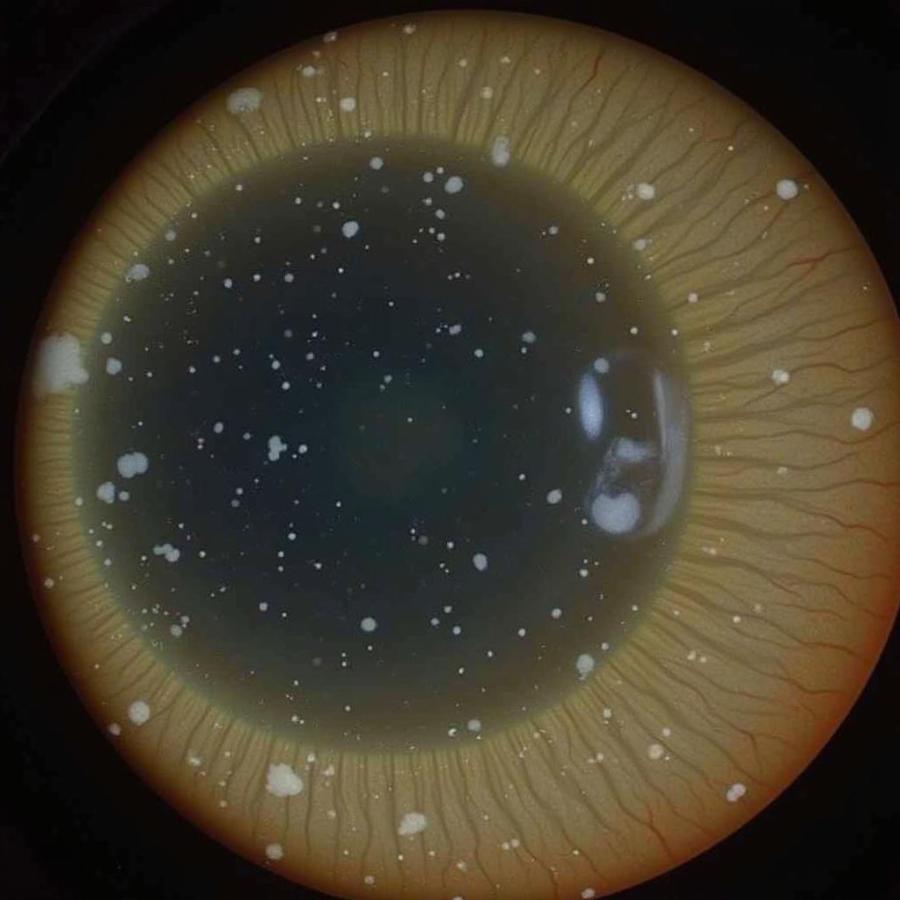Asteroid hyalosis in dogs, a relatively uncommon eye condition, often causes concern among pet owners. This article will delve into what asteroid hyalosis is, how it affects your canine companion, and what you can expect if your dog receives this diagnosis. We’ll explore the symptoms, diagnosis, and management of this condition, providing you with the knowledge you need to ensure your furry friend’s continued eye health.
What is Asteroid Hyalosis in Dogs?
Asteroid hyalosis is characterized by the presence of small, white, opaque spheres within the vitreous humor, the gel-like substance that fills the eye. These “asteroids,” composed primarily of calcium and phosphorus, float freely within the vitreous and are often described as resembling snowflakes or glitter. It’s important to differentiate asteroid hyalosis from other eye conditions, as it doesn’t typically impair vision significantly, unlike cataracts which cloud the lens of the eye. While it may sound alarming, asteroid hyalosis is often a benign condition, meaning it’s typically not harmful and rarely requires treatment.
 Asteroid Hyalosis in a Dog's Eye
Asteroid Hyalosis in a Dog's Eye
Recognizing the Signs: How to Spot Asteroid Hyalosis in Your Dog
Asteroid hyalosis often presents with no noticeable symptoms, particularly in the early stages. As the condition progresses, you might observe a subtle glittering or sparkling appearance within your dog’s eye, especially when light reflects off it. However, because this condition doesn’t usually affect vision, changes in your dog’s behavior, such as bumping into objects, are unlikely. Regular veterinary checkups are crucial for early detection of asteroid hyalosis, especially in senior dogs.
Diagnosing Asteroid Hyalosis: What to Expect at the Vet
Your veterinarian will perform a comprehensive eye exam to diagnose asteroid hyalosis. This involves using an ophthalmoscope to visualize the inside of your dog’s eye, allowing the veterinarian to identify the characteristic white spheres within the vitreous. Differentiating asteroid hyalosis from other more serious eye conditions like cataracts or nuclear sclerosis is crucial for determining the appropriate course of action.
Managing Asteroid Hyalosis: Living with the “Glitter”
Asteroid hyalosis rarely requires treatment. Because the condition doesn’t significantly impair vision or cause discomfort, most dogs with asteroid hyalosis live normal, happy lives. Regular monitoring of the eyes is recommended to ensure that no other eye conditions develop.
Does Asteroid Hyalosis Cause Blindness in Dogs?
Asteroid hyalosis itself does not cause blindness. While the “asteroids” are present within the vitreous, they do not typically obstruct the path of light enough to significantly impact vision. It’s important, however, to rule out other concurrent eye conditions that could affect vision.
Expert Insights:
Dr. Emily Carter, DVM, a renowned veterinary ophthalmologist, explains, “Asteroid hyalosis is often an incidental finding during routine eye exams. While it might appear concerning to owners, it’s usually a benign condition that doesn’t require intervention.”
Dr. Robert Miller, DVM, specializing in canine geriatric care, adds, “Asteroid hyalosis is more common in senior dogs. Regular eye checks are vital for early detection and differentiation from other age-related eye conditions.”
Conclusion
Asteroid hyalosis in dogs, while visually striking, is generally a benign condition that doesn’t significantly impact a dog’s quality of life. While regular monitoring is recommended, treatment is rarely necessary. By understanding this condition, you can alleviate your concerns and ensure your dog continues to enjoy a happy, healthy life.
FAQ:
-
What causes asteroid hyalosis in dogs? The exact cause is unknown, but it’s believed to be related to age-related changes in the eye.
-
Is asteroid hyalosis painful for dogs? No, this condition is not typically painful.
-
Can asteroid hyalosis be cured? There’s no cure, but it doesn’t usually require treatment.
-
Will my dog need surgery for asteroid hyalosis? Surgery is very rarely indicated for this condition.
-
How often should I take my dog to the vet for eye checks? Annual checkups are recommended, especially for senior dogs.
-
Can asteroid hyalosis affect my dog’s behavior? Since vision is typically unaffected, behavioral changes are unlikely.
-
Can asteroid hyalosis occur in other animals? Yes, it can occur in humans and other animals, including cats and horses.